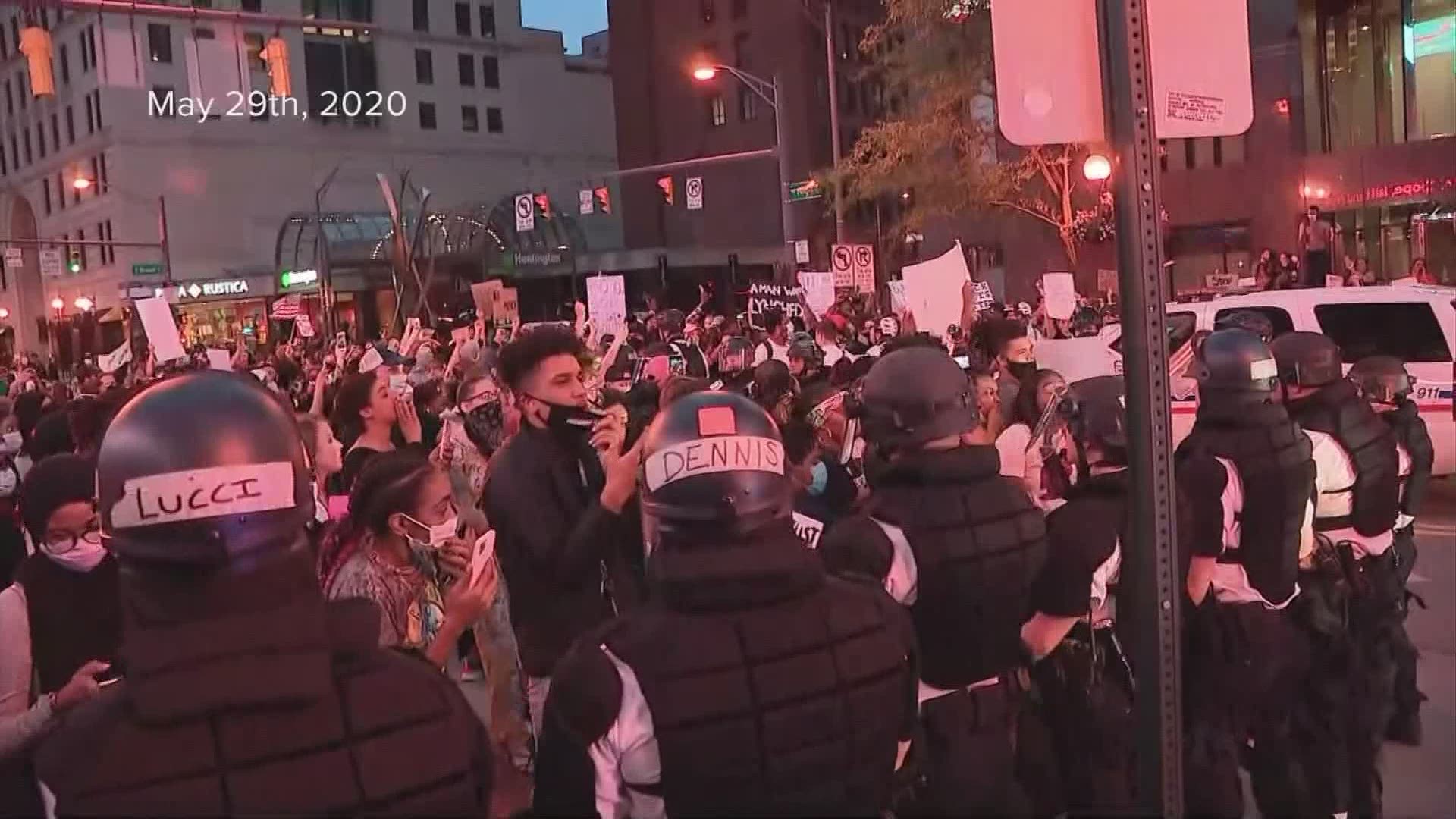A group of investigators has released an independent review into how the city of Columbus responded to protests following the death of George Floyd in Minneapolis.
In July 2020, city leaders and former Columbus police chief Thomas Quinlan put together an independent, outside review of the response.
The investigators included former U.S. attorney for the southern district of Ohio Carter Stewart and The Ohio State University John Glenn College of Public Affairs.
In the report, the group found the city was unprepared for the "size and energy of the protests."
"Once the protests began, there was a lack of coordination - and even regular communication - among city leaders regarding how to respond," the study stated.
The study interviewed more than 170 people including protesters and police.
The study found communication within Columbus police and with the public by police and the city was not effective in providing information or answering the public's questions about what was happening and why.
Many police officers in the study reported being unable to discern peaceful protesters from others and many community members reported physical and mental trauma.
Additionally, officer morale was described as low as police felt that city leaders removed key tools for crowd control without consulting them.
The group says the interviews they conducted revealed a large rift between police and the community, particularly those of color.
"There is distrust, anger, and fear directed towards the police that not only undermines the basic functionality of the criminal justice system, but also sows seeds for future, conflictual protests," the study said.
Officers interviewed also believed "that police-community relationships were stronger prior to 2020, which is one of the reasons why they were surprised by the protests' intensity and emotion."
Protesters interviewed reported, "historical frustration with the police because of racism and bias in police practices."
“My guess is there are a lot police organizations around the country that didn't realize the gap, the distrust that is out there locally and law enforcement nationally,” Columbus Mayor Andrew Ginther said.
Ginther explains, especially as the city continues to see protests, the study will give him a way to look forward.
“The way we do that is continuing to change the culture in the division of police, continue to add additional resources to training to the division of police so they are better able to meet and exceed the communities expectations for interactions,” Ginther said.
The study said there is also a rift between the city leadership and police as well within police between command staff and rank and file personnel.
The report continues, "Perhaps the most notable difference between Columbus and other cities is the depth of rift between city elected leaders and CPD. There was friction in other cities to be sure, but much works needs to be done to repair the rift."
When asked if he takes ownership of that rift, Ginther says absolutely.
"I think we all do. It's a natural tension. The chain of command has to understand that they report to the community ultimately. They get their power and authority from the people," he said.
The report noted that there hasn't been division-wide training of large-scale protests since 2015, and that likely played a factor into the police division not being ready. Ginther promised funding for training.
“Our law enforcement professionals probably had more training on how to deal with spectators after a big sporting event than something the likes of what we saw this summer,” Ginther said.
The group recommends that city leaders and police take active steps toward a "reconciliation with those community members who are disaffected and angry, particularly Black community members."
The group also asked police to consider developing special units to establish contact with activists and demonstrators before, during and after protests.
This review will cost about $250,000. Previously, Quinlan said $200,000 of the money will be provided by police through the drug seizure fund. The additional $49,000 will come from the city's general fund.
Separately, the law firm BakerHostetler was contracted by the city to review claims of misuse of force. As of September 2020, of the 36 total investigations into alleged police misconduct, only one complaint was sustained – which meant the officer did not act within police policy.
Statement from City Attorney Zach Klein
“I firmly believe that it is our responsibility as leaders to hold ourselves accountable to the residents of Columbus. This honest, objective assessment of where we have fallen short, as well as what we did correctly, is a tool for us to make real progress. I hope the independent research and recommendations can serve as an opportunity for us to continue to make necessary changes to our policing protocols and city responses to bring fairness and safety to all members of our community."
Statement from Columbus City Council President Shannon G. Hardin
"This report helps Columbus protect residents' first amendment rights and physical safety, giving clear direction for changes to policy and practices in public safety and government oversight of police. It's no secret that the police response was heavy-handed during the protests of 2020, and Council is proud that we’ve already passed a package of reforms. The City must do better, and this detailed report gives tangible recommendations on ways to improve training, communications, use of force and operational practices to protect residents and officers. We all want safe, peaceful protests to be allowed in Ohio's capital."

